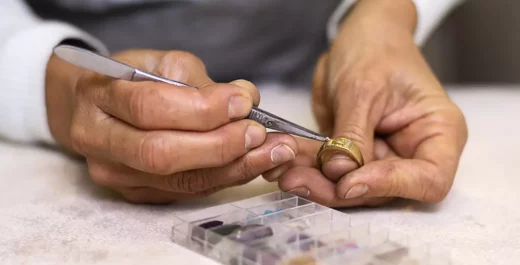The Thailand gem scam preys on your excitement, naivete, and even jet lag as a tourist. This multi-layered scheme employs a series of deceptive tactics and scammers to lure you into purchasing overpriced and often worthless gemstones. Understanding how to avoid this gem scam is crucial for safeguarding your assets and ensuring a pleasant experience in Thailand.
What is a Gem Scam?
Gem scams usually target foreign tourists with the goal of selling them overpriced stones for tens to hundreds of thousands of Thai baht. These tourists often won’t notice the scam until it is too late and they are back in their home country. The Thailand gem scam often follows a standard structure:
Setup and Approach
Scammers typically approach you, seemingly offering helpful information that your sightseeing destination (temple, museum, palace, etc.) is closed for the day. They may fabricate a story such as a royal family visiting it for a special occasion. Instead, they will offer an intriguing alternative sightseeing destination, such as a visit to another temple, that happens to include a stop at a gem center with exclusive deals.
While sightseeing, you might encounter a stranger who highly recommends the gem center and claims to have made a profit reselling the “jewels.” These are almost certainly accomplices, as gem scam victims have reported being approached by both Thai and foreign strangers who have persuaded them to purchase gems.
At the Gem Center
If you agree, your driver will take you to a professional-looking establishment selling jewelry and stones at “wholesale prices” through a fake government-sponsored export program or as a limited-time sale. The salespeople will address your concerns of legitimacy with false certifications, guarantees, and promises. Their pushy tactics may ultimately persuade you to purchase these low-quality stones or fake gems made of glass or synthetic materials. Some scammers may offer to ship your gems to you to delay your realization of the scam.
The Aftermath
After the transaction is complete, the scammer’s demeanor towards you might become more dismissive or unfriendly. Alternatively, they may offer free sightseeing trips around town to distract you from noticing the scam. Once the scam is complete, you are unlikely to convince the scammer to return or refund your money.
How to Avoid Gem Scams
You can protect yourself from gem scams by understanding the intricate methods scammers use to take your money and learning what to avoid.
Recognize the Initial Approach
- Stay Alert: Exercise caution when approached by strangers, especially near popular tourist attractions. Strangers offering alternative destinations due to purported closures are usually lying. Politely decline and verify information with official sources. Note that scammers are usually well-presented, speak good English, and can be either Thai or foreign of any nationality.
- Reject Unsolicited Deals: Reject propositions of “exclusive deals” at “government gem centers.” The Thai government does not operate any such centers and reputable gem dealers don’t rely on such solicitations.
Identify Transportation Red Flags
- Fair Fares: Decline suspiciously cheap tuk-tuk or taxi rides. While bargaining is generally accepted, drivers will not accept overly cheap fares unless they intend to make a larger sum off you later.
- Question Unfamiliar Routes: Be wary if the suggested route to your destination appears excessively long or avoids well-traveled tourist areas.
Discern Legitimate Dealers
- Check Authenticity: A seemingly opulent establishment doesn’t equate to legitimacy. Conduct independent research to identify reputable gem dealers before buying.
- Resist High-Pressure Sales Tactics: Salespeople advertising limited-time offers or “exclusive opportunities” are often lying. Politely decline and move on to a more reputable establishment.
- Scrutinize Testimonials: Be wary of enthusiastic “customers” or online reviews praising their experiences, as they may be part of the scam.
Beware of Deceptive Sales Techniques
- Maintain Objectivity: Don’t be swayed by the flattery used by salespeople to gain trust and influence purchase decisions.
- Educate Yourself: Research realistic gem prices before committing to a purchase. If the deal seems too good to be true, it likely is.
- Question Guarantees: Verify the validity of any certificates or money-back guarantees offered by these establishments.
Protect Yourself
- Inspect Before You Invest: Don’t be pressured into buying without thoroughly examining the gems. Consider seeking a professional appraiser if unsure.
- Credit Card Convenience: Legitimate jewel businesses typically accept credit cards. Insistence on cash payments should raise a red flag.
By employing these strategies and staying aware, you can safeguard yourself from the Thailand gem scam. This will ensure you have a safer and more enjoyable travel experience, allowing you to focus on the best Thailand has to offer.
What To Do if You are Scammed
Falling victim to the Thailand gem scam might feel embarrassing and frustrating, but taking decisive action can increase your chances of recovering some of your losses. The following steps can help you recover losses and move on from the scam experience:
- Keep All Evidence: Keep all the items you purchase, any receipts, and other relevant documents.
- Negotiate with the Seller: You can attempt to negotiate a reasonable partial refund with the shop owner, but refrain from aggressive confrontation.
- Report the Scam: Contact the Thai tourist police either in person or at 1155.
- Contact Your Credit Card Company: If the purchase was made with a credit or debit card, contact your bank to inquire about potential routes to recover funds and to cancel your card if you suspect it has been compromised.
- Retain Legal Counsel: Consult with a lawyer specializing in fraud cases in Thailand. A qualified lawyer can advise you on your legal rights in Thailand and potential ways to recover your losses.
Siam Legal is a full-service law firm with decades of experience in Thai law. Our expert fraud advisors offer dedicated and personalized support to help you recover losses and recover from the effects of a gem scam.

Leave a Comment